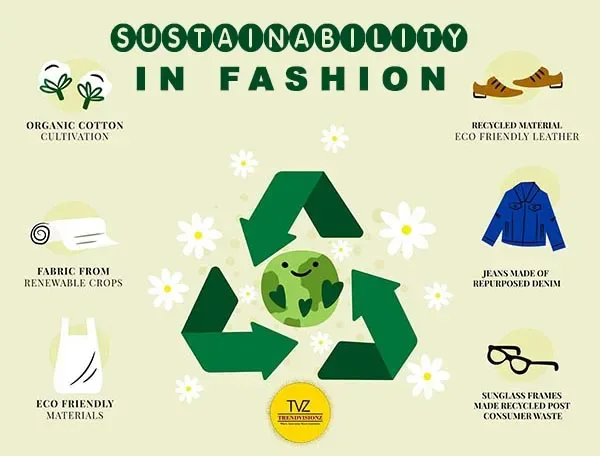Find Cape Town Sustainable Fashion Boutiques and Brands
Find Cape Town Sustainable Fashion Boutiques and Brands
Blog Article
Keep Ahead of the Contour by Exploring Innovative Fashion Trends
In an industry as dynamic as style, remaining ahead entails more than just complying with current fads-- it demands an exploration of advancement. The convergence of modern technology and fashion declares a brand-new period of customer engagement.

Accepting Smart Textiles
Recently, the garment industry has seen a transformative change with the combination of wise fabrics, an advanced advancement that blends modern technology with fabric. This evolution stands for not just a blend of looks and functionality however additionally a significant jump towards sustainability and personalization in fashion. Smart textiles, also referred to as e-textiles, installed sophisticated electronic devices such as sensors and conductive threads within the textile, making it possible for garments to interact with the atmosphere or the wearer.
These fabrics are designed to keep track of physiological criteria, such as heart rate or body temperature level, giving real-time health analytics. Past health applications, clever textiles are likewise being used for adaptive clothes, which can transform color or pattern in response to ecological stimuli, thus providing a dynamic style experience.
In addition, the growth of energy-harvesting textiles that create power from activity or sunlight is paving the method for self-sufficient wearable technology. This advancement is appealing to eco aware customers and designers intending to minimize the eco-friendly impact of fashion. As r & d in this field advance, smart fabrics are anticipated to become increasingly widespread, reshaping the landscape of contemporary fashion with their multifunctional abilities.
The Rise of 3D Printing
Reinventing the manufacturing landscape, 3D printing has actually become a game-changer in the garment industry. This cutting-edge technology has made it possible for designers to push the limits of imagination, creating intricate and customized garments that were previously inconceivable. By leveraging electronic style and additive manufacturing, 3D printing facilitates the creation of complicated geometries and patterns, permitting designers to trying out brand-new structures and frameworks.
A remarkable benefit of 3D printing in vogue is its capability to generate on-demand, reducing waste and lowering inventory demands. This performance not only optimizes production procedures but likewise permits quick prototyping, enabling developers to bring their visions to life in a shorter timeframe. Additionally, 3D printing sustains customization to a degree unrivaled by conventional methods, offering special styles and personalized fits tailored to individual customer preferences.
The increase of 3D printing has likewise democratized fashion, making it obtainable to emerging developers who can now make high-grade items without substantial monetary investment in traditional production framework. As innovation proceeds to advancement, the apparel industry is positioned to harness the complete potential of 3D printing, checking out new materials and strategies that will definitely redefine how style is conceived and produced.
Sustainable Style Advancements
As the garment industry comes to grips with journalism demand for ecological duty, sustainable fashion innovations have arised at the leading edge of transformative modification. The expanding awareness of ecological effect has actually sustained a shift towards more eco-conscious practices and products. Designers and brand names are now prioritizing sustainability, including methods that minimize waste and reduce carbon impacts.
One significant growth is the rise of circular fashion, which stresses recycling and upcycling to prolong the lifecycle of garments. This approach not only lowers waste but also encourages customers to embrace a more mindful strategy to Learn More clothing usage. In addition, using lasting products, such as natural cotton, hemp, and recycled polyester, has acquired grip. These materials need much less water and power throughout manufacturing, substantially reducing environmental effect.
One more development depends on the adoption of innovative dyeing methods that utilize waterless processes or natural dyes, thereby minimizing the substantial quantities of water and chemicals commonly used in textile dyeing. Furthermore, advancements in biotechnology have brought about the production of lab-grown natural leather and textiles, using environmentally friendly and cruelty-free options to standard products. With these introducing initiatives, the garment industry is making significant strides towards a much more sustainable future.

Tech-Integrated Garments
Tech-integrated garments represents a revolutionary fusion of style and technology, reshaping exactly how individuals connect with their clothes. This ingenious domain is marked by the incorporation of clever textiles and ingrained digital elements, improving both capability and visual appeal. From health and fitness trackers embedded in sportswear to heated coats managed through mobile phone apps, tech-integrated clothing provides customers unmatched convenience and adaptability.
Introducing brand names are driving this trend, concentrating on producing garments that reply to environmental stimuli or user commands. For example, some garments can alter color or pattern in reaction to temperature level shifts, while others include biometric sensing units to keep an eye on wellness metrics like heart rate or tension levels. The smooth combination of innovation into fabrics additionally reaches ecological sustainability, with efforts to develop self-cleaning fabrics or garments that adapt to weather problems, thus decreasing the demand for numerous layers.
In addition, the advent of wearable modern her latest blog technology is not simply limited to apparel yet extends to accessories like watches and eyewear, more widening the range of tech-integrated style. As the sector remains to innovate, the possibility for customization and personalization in apparel grows, offering customers unique, tech-enhanced fashion experiences that deal with their private demands and preferences.
Future of Virtual Style
In recent times, the future of online fashion has become a transformative force within the industry, leveraging innovations in electronic innovation to redefine how fashion is created, experienced, and consumed. By integrating enhanced reality (AR), digital fact (VR), and 3D style tools, designers can currently craft interactive and immersive experiences that transcend traditional style limits. Virtual style enables the creation of garments that exist only in digital atmospheres, offering countless opportunities for technology without the restrictions of physical manufacturing.
This digital change not just offers chances for innovative expression but also addresses sustainability worries intrinsic in standard style techniques. Cape Town Sustainable Fashion. By eliminating the requirement for physical sources, digital style minimizes waste and decreases carbon footprints. Additionally, the surge of virtual fashion lines up with the boosting consumer need for one-of-a-kind and personalized experiences, as digital garments can be customized and tailored to individual choices effortlessly

Conclusion
The garment industry's future hinge on the assimilation of sustainable methods and ingenious innovations - Cape Town Sustainable Fashion. Smart fabrics and tech-integrated clothing are boosting performance, while 3D printing provides opportunities for modification and waste reduction. Lasting style, via round methods and environmentally friendly materials, shows a commitment to ecological stewardship. Furthermore, virtual style is poised to redefine consumer communications. Adapting to these fads is essential for brand names looking for to remain relevant and affordable in this swiftly advancing landscape.
In current years, the style market has witnessed a transformative shift with the combination of wise fabrics, an advanced development that mixes modern technology with textile.As the style industry grapples with the pressing requirement for ecological obligation, sustainable style technologies have arised at the center of transformative adjustment.In current years, the future of digital style has actually arised as a transformative pressure within the market, leveraging improvements in electronic modern technology to redefine just how style is produced, experienced, and taken in. The rise of virtual fashion straightens with the raising customer need for special and tailored experiences, as online garments can be personalized and tailored to individual choices this page with simplicity.
The fashion industry's future lies in the integration of sustainable techniques and ingenious innovations.
Report this page